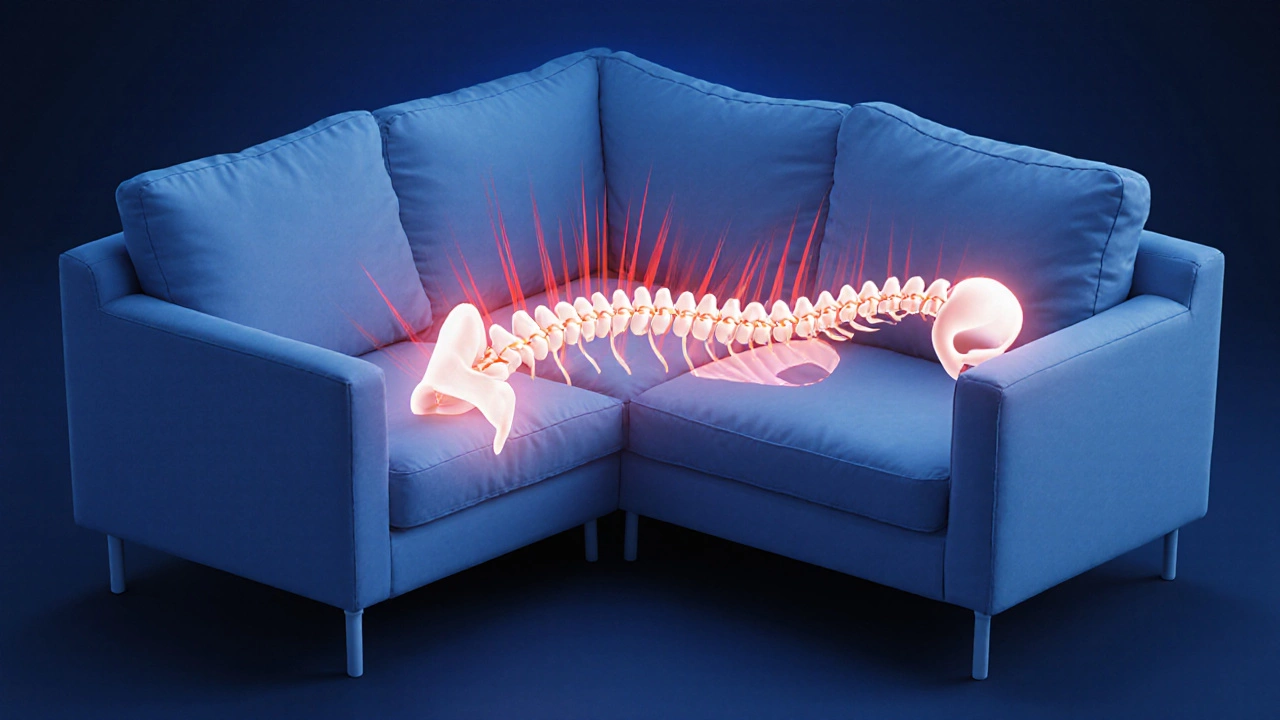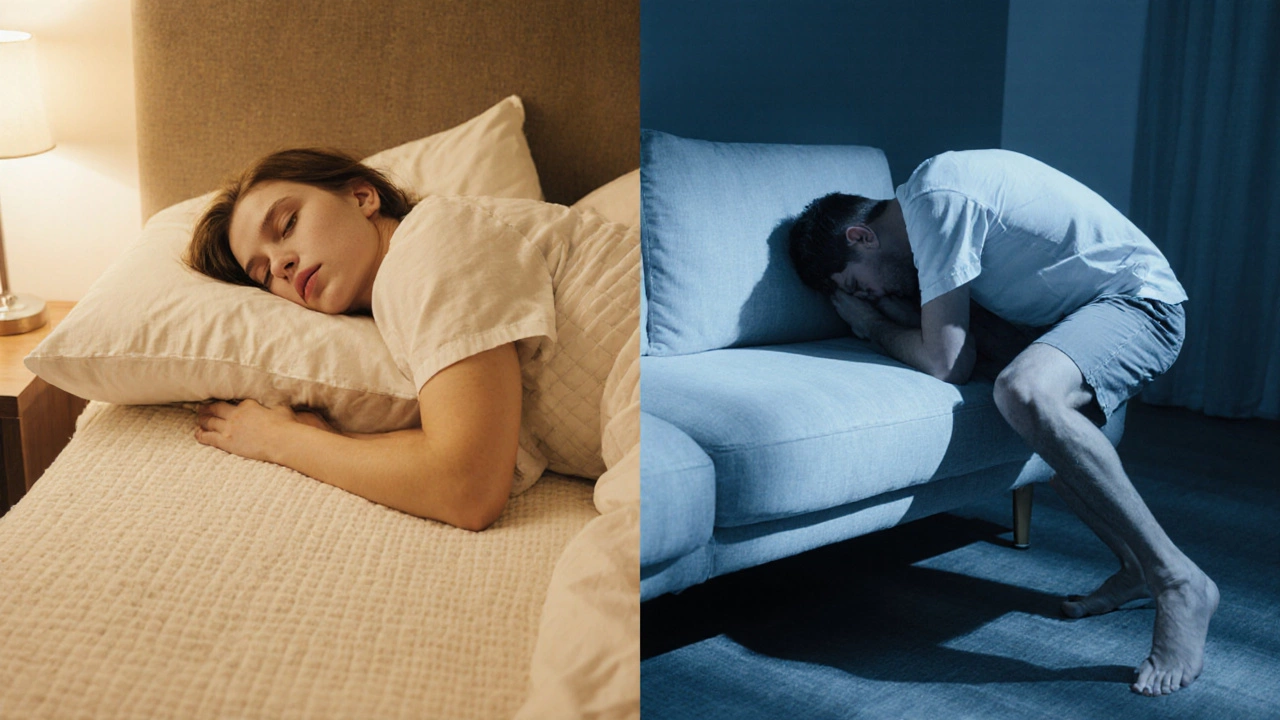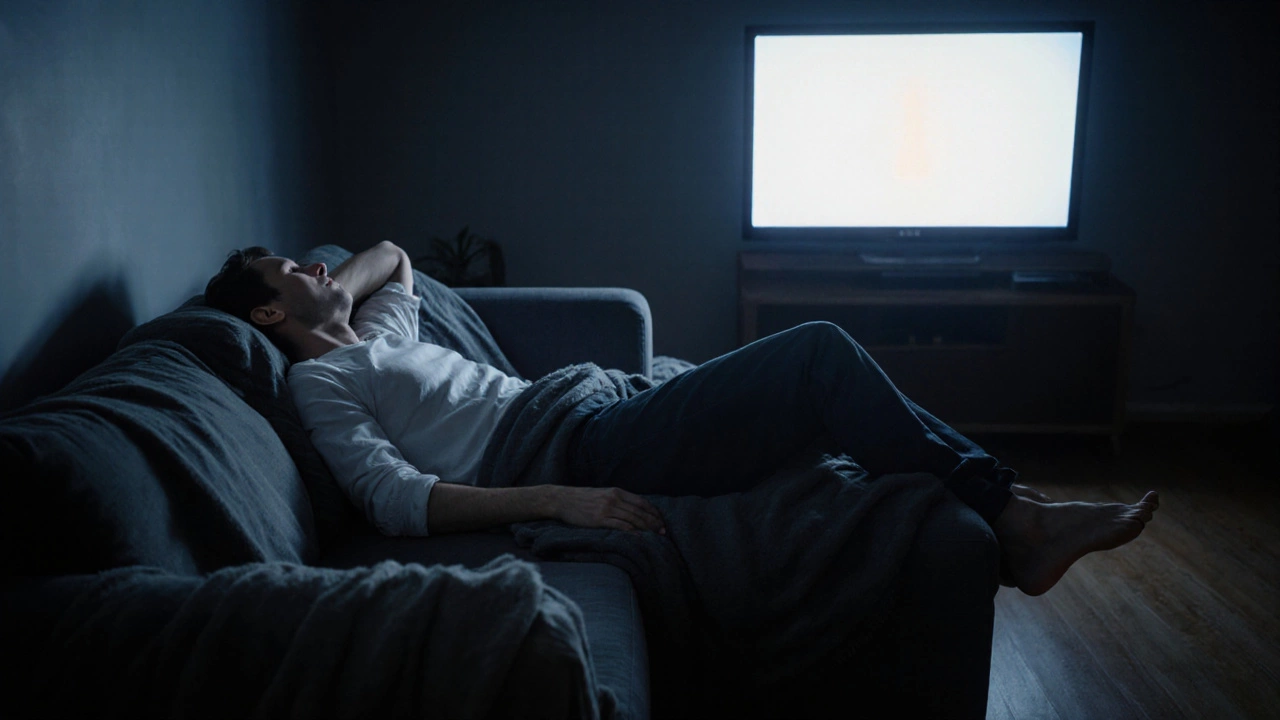Most people have done it at least once. You’re watching a late-night show, you feel your eyes getting heavy, and before you know it, you’re sprawled out on the sofa with a blanket draped over you. It feels fine in the moment. But if you’re doing this regularly - especially on a corner sofa - you’re setting yourself up for trouble you didn’t even know was coming.
Your spine isn’t designed for couches
Your spine has three natural curves: one in the neck, one in the mid-back, and one in the lower back. A good mattress supports all three. A sofa? Not even close. Corner sofas, while comfy for lounging, are built for sitting, not sleeping. Their cushions are too soft in the middle and too flat on the sides. When you lie down, your lower back sinks, your hips tilt, and your neck twists to find a position that doesn’t hurt. That’s not rest - that’s strain.
A 2023 study from the Australian Chiropractic Association tracked 450 adults who regularly slept on sofas. After six months, 68% reported chronic lower back pain. That’s not coincidence. It’s physics. Your body’s weight isn’t distributed evenly on a sofa. The result? Misalignment. Over time, that misalignment leads to muscle tension, nerve pinching, and even disc issues.
It’s not just your back - your neck pays the price too
Think about how you sleep on the sofa. You’re probably propped up on one arm, or your head is hanging off the edge. Maybe you’re curled into a half-lotus position because the sofa’s too short. Your neck doesn’t have the support it needs. That’s why so many people wake up with stiff necks, headaches, or tingling in their arms after a night on the couch.
Unlike a pillow designed for spinal alignment, sofa cushions flatten under pressure. They don’t cradle your head. They just let it drop. And when your head is tilted even 15 degrees off neutral for hours, your cervical spine gets compressed. That’s how you end up with tension headaches that last all day - or worse, recurring pinched nerves that need physiotherapy.
Sleep quality takes a hit - even if you think you’re fine
You might tell yourself, “I slept fine.” But sleep quality isn’t just about how long you were unconscious. It’s about how many times you shifted, how often you woke up briefly, and whether your body entered deep, restorative sleep.
On a sofa, you rarely get past light sleep. The lack of support means your muscles are constantly adjusting - trying to find a position that doesn’t hurt. That keeps your nervous system on alert. You might sleep for eight hours, but your body never fully shuts down. The result? You wake up tired, even though you “slept all night.”
Research from the Sleep Foundation shows that people who sleep on sofas average 20% less REM sleep than those who sleep on proper mattresses. REM sleep is when your brain processes emotions, consolidates memories, and repairs tissues. Skimping on it doesn’t just make you groggy - it weakens your immune system and increases stress hormones.

Corner sofas are worse than regular ones
Not all sofas are created equal when it comes to sleeping. Corner sofas, while great for lounging with friends or watching TV, are the worst offenders. Why? Because they’re designed with angular shapes, deep seats, and uneven cushioning. When you lie down, your body doesn’t lie flat - it slumps into the corner, twisting your spine into an unnatural S-curve.
Plus, corner sofas often have firm armrests that dig into your ribs or shoulders. You can’t roll over easily. You’re stuck in one position, or you have to contort yourself to move. That’s why people who sleep on corner sofas report more joint pain, shoulder stiffness, and hip discomfort than those who sleep on regular sofas.
And let’s not forget the size. Most corner sofas are too short for adults over 5’8”. Your feet dangle. Your knees bend at odd angles. Your legs don’t get proper support. That’s a recipe for poor circulation and numbness.
It’s not just physical - your sleep habits get messy
Every time you sleep on the sofa, you’re training your brain to associate that space with sleep. But your sofa is also where you eat snacks, scroll through your phone, and argue with your partner. That muddles your brain’s sleep cues. Over time, your body stops seeing your bed as the only place for rest.
This is called “sleep environment confusion.” It’s one of the leading causes of insomnia in people who don’t have a consistent sleep routine. If you’re used to falling asleep on the couch, your brain won’t relax when you finally get into bed. You lie there staring at the ceiling, wondering why you can’t sleep - even though you’re exhausted.
And if you’re doing this because your bed is uncomfortable? That’s a red flag. You shouldn’t be forced to choose between a bad bed and a worse sofa. The real fix isn’t staying on the couch - it’s upgrading your sleep surface.

What should you do instead?
If you’re sleeping on the sofa because you don’t have a spare room, or because your bed is too hard, here’s what actually works:
- Get a mattress topper. A 3-inch memory foam or latex topper on your bed can make a cheap mattress feel like a luxury one. Costs under $150. Lasts 5+ years.
- Try a fold-out sofa bed. If you need extra space, invest in a quality sofa bed with a proper spring or foam base. Look for ones with a metal frame - not just a fold-out mattress on wood slats.
- Use pillows like a pro. If you must sleep on the sofa, put a pillow under your knees to flatten your lower back. Put another behind your neck to keep your head aligned. It’s not ideal, but it’s better than nothing.
- Make your bed inviting. Clean sheets, a cool room, and no screens for an hour before bed can make your bed the most appealing place to sleep - no matter how old it is.
There’s no magic trick. The truth is simple: your body needs support. A sofa is not a bed. And no matter how cozy it feels in the moment, it’s not doing your spine, your sleep, or your long-term health any favors.
It’s not about comfort - it’s about longevity
You might think, “I’m young. I’ll be fine.” But back problems don’t show up overnight. They build up slowly - over years of sleeping in awkward positions, ignoring the ache, telling yourself it’s temporary. By the time you’re 40, you might be dealing with chronic pain, reduced mobility, or even surgery.
People who sleep on beds with proper support report 50% fewer visits to physiotherapists and chiropractors by age 50. That’s not just about comfort. That’s about keeping your body working - without pain - for decades.
So next time you feel the urge to crash on the sofa, ask yourself: Are you choosing convenience - or are you choosing your future self?
Is it ever okay to sleep on the sofa?
Occasionally, yes - like when you’re sick, traveling, or in an emergency. But if you’re doing it more than once a week, it’s a habit that needs changing. Your body isn’t built for it, and long-term use leads to pain and poor sleep quality.
Why do corner sofas make back pain worse?
Corner sofas force your body into twisted positions. The deep, angled seat causes your lower back to sink while your hips tilt forward. Your spine gets pulled out of alignment, and your neck has to compensate. This uneven pressure leads to muscle strain and disc stress over time.
Can a pillow fix sleeping on the sofa?
Pillows can help a little - placing one under your knees and another behind your neck reduces strain. But they don’t fix the core problem: the sofa lacks even, full-body support. It’s like using a towel as a seatbelt - it helps, but it’s not safe long-term.
What’s the best alternative to sleeping on the sofa?
A quality mattress with a supportive topper. Memory foam or hybrid mattresses with medium-firm support work best for most people. If space is tight, a fold-out sofa bed with a proper internal frame is better than a regular sofa. Avoid inflatable mattresses - they lose support quickly.
Does sleeping on the sofa affect my posture during the day?
Yes. Poor sleep leads to muscle tightness and misalignment that carries into your waking hours. You’ll slump at your desk, walk with a slight hunch, or feel stiff when standing. Your body remembers the positions you held while sleeping - for better or worse.

